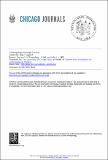Anthropology through Levinas : knowing the uniqueness of ego and the mystery of otherness
Abstract
An anthropological commonplace since Evans-Pritchard has been that ethnographic subjects will have their rationality circumscribed by the discursive opportunities made available by a “culture.” Hence, social science comes to terms with the “internal” nature of judgements (Winch). Ultimately, the relativist nature of both Winch’s and Evans-Pritchard’s conclusion has its source in Wittgenstein’s philosophy. For Wittgenstein, “the limits of my language mean the limits of my world.” Moreover, “language” in this connection extends to the “textual” nature of behavior per se. There exists a determining habituation of embodiment and dwelling as well as of reasoning, believing, and talking. This article explores the nature of a pretextual or nontextual sphere that exists beyond conventional—“cultural”—languages. Wittgensteinian assumptions are set against those of Max Stirner and Emmanuel Levinas. While in many ways disparate, the writings of Stirner on the ego and of Levinas on the “other” both insist that knowledge can be derived—knowledge, indeed, of a fundamental, even absolute, nature—by way of a transcending of a taken-for-granted symbolic, conceptual, textual, and doctrinal language-world. What is key is the attention one pays to corporeality: to the “flesh and mind” of the self (Stirner), to the “body and face” of the other (Levinas). The article is theoretical and epistemological in register. An ethnographic afterword points in the direction of how the argument might be grounded in representations of fieldwork encounters.
Citation
Rapport , N J 2015 , ' Anthropology through Levinas : knowing the uniqueness of ego and the mystery of otherness ' , Current Anthropology , vol. 56 , no. 2 , pp. 256-276 . https://doi.org/10.1086/680433
Publication
Current Anthropology
Status
Peer reviewed
ISSN
0011-3204Type
Journal article
Collections
Items in the St Andrews Research Repository are protected by copyright, with all rights reserved, unless otherwise indicated.

